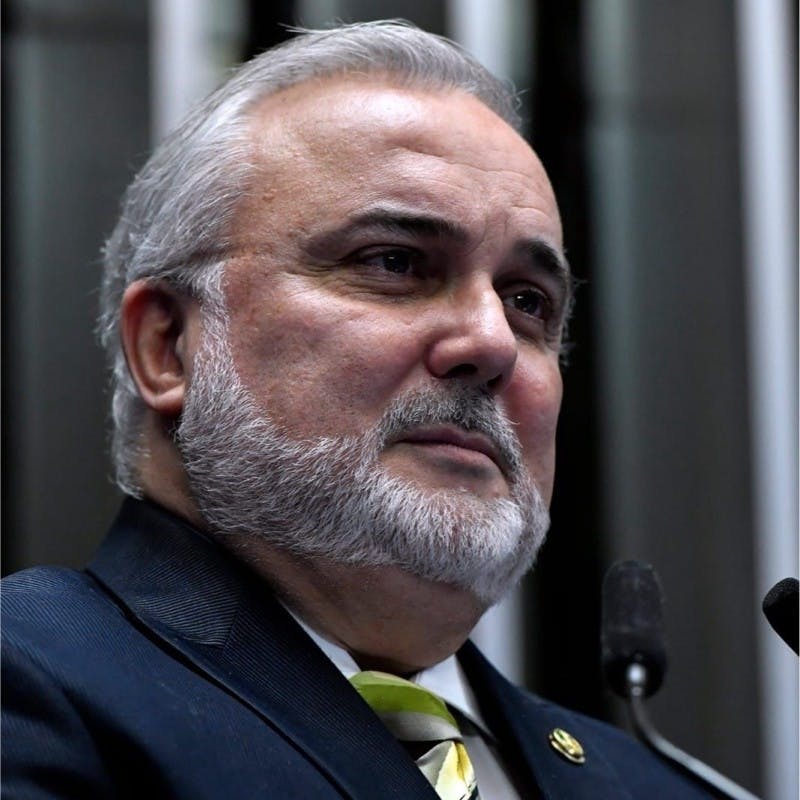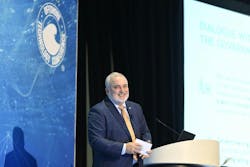OTC 2024: Petrobras CEO stresses importance of partnerships during energy transition
By Ariana Hurtado, Editor and Director of Special Reports
HOUSTON — In a jam-packed, standing-room-only session at the Offshore Technology Conference (OTC), Petrobras President and CEO Jean Paul Terra Prates emphasized that synergy is the lifeblood of the industry and that collaboration with suppliers and investors will leverage the sector and pave the way for an energy transition without leaving behind workers, service providers, contractors or communities.
The "Petrobras in the Energy Transition: Producing Low Carbon Oil and Preparing for the Future" session was part of the Executive Dialogue series that took place Monday morning at OTC in Houston.
Terra Prates compared the energy transition to that of someone deciding to suddenly become vegetarian and explained this isn't something that takes place overnight but will be a gradual change.
"A radical change...it's not something natural for human beings," he said. "We're dependent on oil and gas. It's not easy to change from that."
The future of the oil and gas market, he added, lies within synergy and cooperation, partnerships with suppliers, and integration and development of disruptive technologies.
The energy transition challenge, he said, is that "we're not King oil anymore; we need to face the fact that we will have to be competitive towards other fuels."
Society likely won't use as much oil in 50 years, he continued, "not because the oil is finished; it's because we won't use as much oil as we needed before."
His presentation highlighted the challenge is the oil and gas sector is vital to structuring and financing the energy transition and leveraging it on a large scale. Therefore, international cooperation, financing and compensation arrangements are fundamental.
For example, Petrobras has expanded its operations in the low-carbon business areas of offshore wind, solar and onshore wind, CCUS, hydrogen and biorefining.
Offshore wind
For offshore wind, Petrobras has been assessing and reviewing projects and technologies that are similar to what the company already does and has been doing for years.
"When we look at wind, we look at offshore wind because we work with all the complex machines we already fabricate and operate every day, like an FPSO in the Campos or Santos basin," Terra Prates said. "I always played with no demerit that wind offshore is Playmobil for us. I mean, it's a kid's game. We're ready to do that big time. And we're now working and helping Brazil to get along with a law that will be in house or at least begin the bids of blocks offshore. So we can get there."
Last month Petrobras signed a memorandum of understanding with the government of the State of Rio Grande do Norte, Brazil, concerning a potential offshore wind pilot project in the state. The company will undertake studies on the possible environmental and social impacts.
CCUS
Petrobras is also heavily involved with CCS/CCUS operations.
"In our case, we are already doing a lot of things [with CCS and CCUS]. We are already responsible for more than 20% of the reinjected CO2 in the world," Terra Prates said. "So we have the biggest CO2 injection storage program in the world. You will say 'OK, this is CO2 that comes out from the gas and the oil production of the presalt.' Yes, but if this was not done, this CO2 would be emitted anyway."
Earlier this year, Petrobras invested $1.5 billion in HISEP decarbonization technology. This project involves the use of subsea processing to capture CO2-rich dense gases for reinjection into the reservoir.
"We're doing great things right now because, with HISEP," he added, "we will be able to reinject this CO2 from the bottom of the sea, not anymore at the platform. So this is patented by Petrobras. This is a Petrobras development from years and years of research in our research center, which is the biggest of Latin America."
Hydrogen
Terra Prates added that hydrogen is also similar to their current projects because the company is accustomed to dealing with natural gas.
"We hope that we will be able to do most of our energy transition with things that are very similar in logistics and handling, in thinking, in analyzing economically, etcetera, to things that we already do with excellency," he added.
In March Petrobras and Mitsui & Co. (Brasil) signed a memorandum of understanding during the CERAWeek by S&P Global conference. They plan to jointly assess opportunities for the production of sustainable hydrogen and its derivatives, the use of biomethane, and CO2 capture, transportation and storage.
Dialogue with government
Another major aspect of state-controlled Petrobras' business strategy is dialogue with the government.
"We need to obey national state policies, as any other company has, through legislation," Terra Prates said. "We need to go through technical and market rules given by regulation. We need to, also in our case, respect the guidance as a state-controlled company."
However, he pointed out that sometimes governments will intervene in operations, resulting in more challenges for the industry.
"We all must be prepared for that because it will happen not only in Brazil, but everywhere," he said. "Places that will lag behind in energy transition will be very prone to get state intervention. Governments will intervene directly in a good and bad way—sometimes in very bad ways—because not all governments know about the sector, and they think that sometimes just raising one tax or doing something unilaterally will resolve the problem. And it takes sometimes 10 years to figure out that was not a correct policy."
Terra Prates emphasized the importance of the oil and gas industry working with governments to ensure everyone is on the same page about the energy transition process and steps to get there.
"It is our duty as companies in the transition to be all together with governments all the time, and this means federal governments, state governments, municipal governments or city governments because they are very important. We need to interact with them all the time, not only because of our consequences of operations, but also because we need to get from them what they expect as energy transition. At the end, they will be the consumers that will resist or not resist to changing from one tool to another, [or] from one source to another."
Investing in society
Perhaps ironically to some, Terra Prates said the industry needs to produce more oil to do the energy transition.
"We need to do it because our oil is decarbonized, is more responsible, and the countries and companies that have that should be stimulated to produce the last drops of oil, as we will be trying to do in our administration always," he said. "Because this will pay royalties, this will pay taxes, will develop new technologies, will develop new persons to work—and this will make the difference."
He emphasized that the industry and governments need to invest in society where reserves are good and said it is the industry's responsibility to help them implement social policies. He added, "We need to make sure that national governments—again, these are our best partners, not our enemies—they have to have the conditions to do that, because they will receive the money."
Brazil's call to attention at COP30
The UN has selected Brazil to host the 2025 COP30 international climate meeting. Terra Prates said Petrobras' top priority during the show will be to highlight how the country is in the middle of the energy transition and is proving to be successful with both oil and gas as well as renewables.
"[It] will be a fantastic opportunity for showing a country that is big, [with] a big economy that already has done its energy transition," he said. "We have no doubt about it. When we talk about more, or half at least, of our energy mix being renewable, we're talking about a country that has at least four times the majority of the other countries in terms of renewable but sufficient energy mix. When we talk about electricity mix, we're above 80%."
Those numbers include the hydro-dams that have been built in the country. Also, 13% of Brazil's energy mix is wind, which has been developed since 2007-2008.
"We need to voice that out [at COP30]; we need to show to people that this is possible. And we are still producing oil and exporting more than Kuwait," he continued.
"This is a country that is in the middle of the transition. It's not that we are going to aim at exporting 1.5 million barrels a day in the next 10 years every year. No, it's the middle of the jump; we are in the middle of it. It makes sense that we are at the peak of both things," he concluded. "Now we want to phase in [and] phase out one thing ...but we are in the middle of the cycle."
05.06.2024
About the Author
Ariana Hurtado
Editor-in-Chief
With more than a decade of copy editing, project management and journalism experience, Ariana Hurtado is a seasoned managing editor born and raised in the energy capital of the world—Houston, Texas. She currently serves as editor-in-chief of Offshore, overseeing the editorial team, its content and the brand's growth from a digital perspective.
Utilizing her editorial expertise, she manages digital media for the Offshore team. She also helps create and oversee new special industry reports and revolutionizes existing supplements, while also contributing content to Offshore's magazine, newsletters and website as a copy editor and writer.
Prior to her current role, she served as Offshore's editor and director of special reports from April 2022 to December 2024. Before joining Offshore, she served as senior managing editor of publications with Hart Energy. Prior to her nearly nine years with Hart, she worked on the copy desk as a news editor at the Houston Chronicle.
She graduated magna cum laude with a bachelor's degree in journalism from the University of Houston.





